International Relations of Middle East IRPG 843 Essay 2022
VerifiedAdded on 2022/10/01
|13
|2843
|54
Essay
AI Summary
Contribute Materials
Your contribution can guide someone’s learning journey. Share your
documents today.
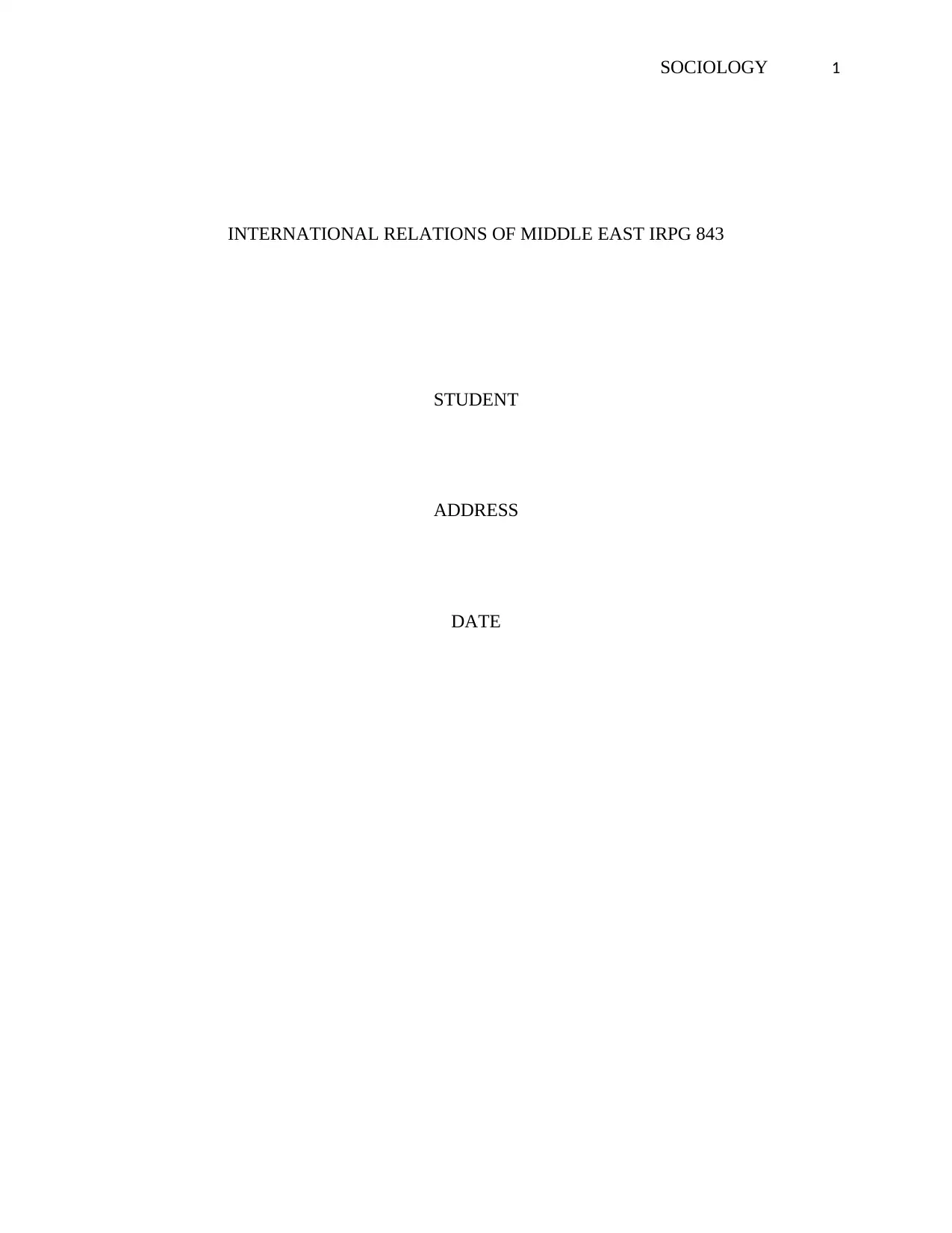
SOCIOLOGY 1
INTERNATIONAL RELATIONS OF MIDDLE EAST IRPG 843
STUDENT
ADDRESS
DATE
INTERNATIONAL RELATIONS OF MIDDLE EAST IRPG 843
STUDENT
ADDRESS
DATE
Secure Best Marks with AI Grader
Need help grading? Try our AI Grader for instant feedback on your assignments.
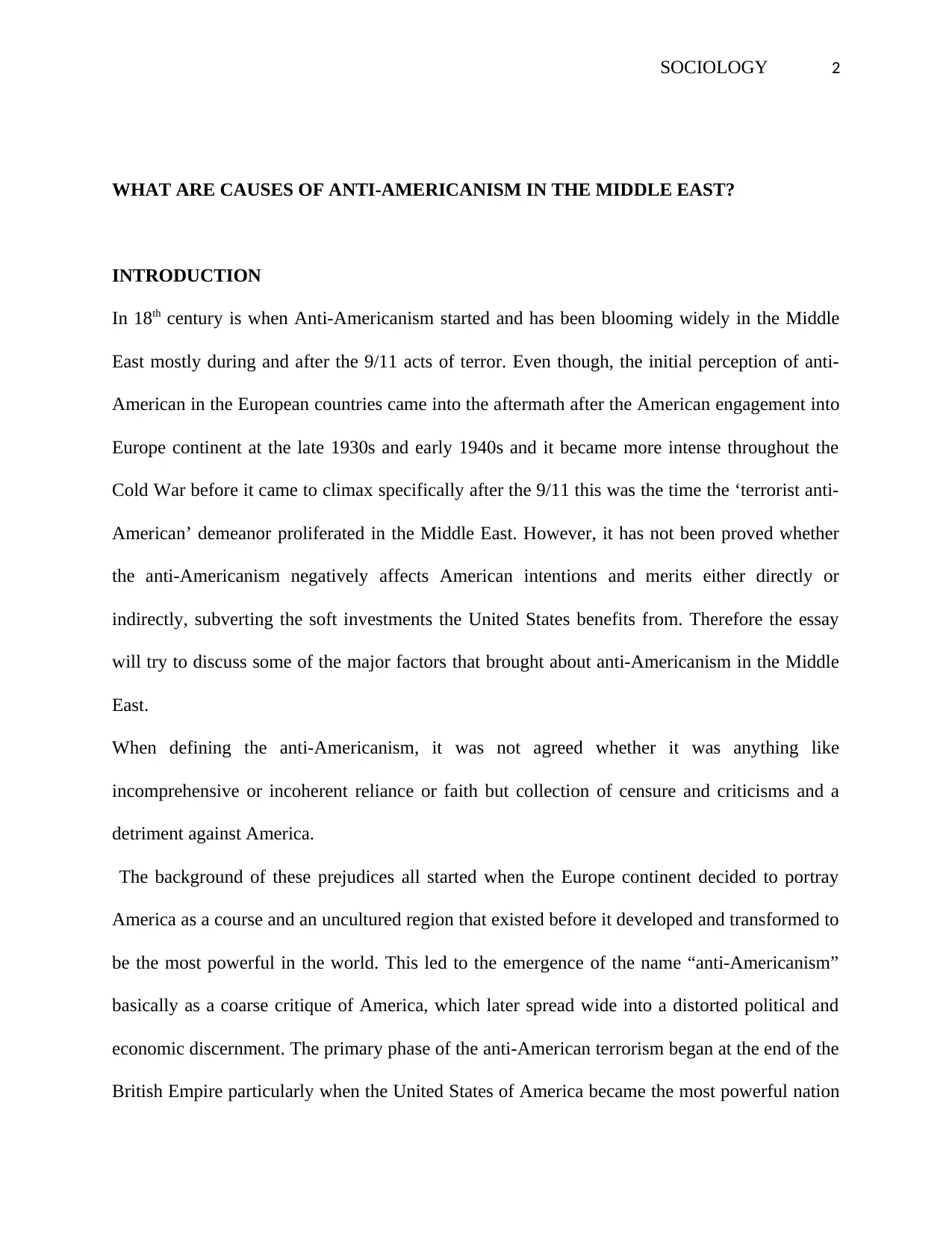
SOCIOLOGY 2
WHAT ARE CAUSES OF ANTI-AMERICANISM IN THE MIDDLE EAST?
INTRODUCTION
In 18th century is when Anti-Americanism started and has been blooming widely in the Middle
East mostly during and after the 9/11 acts of terror. Even though, the initial perception of anti-
American in the European countries came into the aftermath after the American engagement into
Europe continent at the late 1930s and early 1940s and it became more intense throughout the
Cold War before it came to climax specifically after the 9/11 this was the time the ‘terrorist anti-
American’ demeanor proliferated in the Middle East. However, it has not been proved whether
the anti-Americanism negatively affects American intentions and merits either directly or
indirectly, subverting the soft investments the United States benefits from. Therefore the essay
will try to discuss some of the major factors that brought about anti-Americanism in the Middle
East.
When defining the anti-Americanism, it was not agreed whether it was anything like
incomprehensive or incoherent reliance or faith but collection of censure and criticisms and a
detriment against America.
The background of these prejudices all started when the Europe continent decided to portray
America as a course and an uncultured region that existed before it developed and transformed to
be the most powerful in the world. This led to the emergence of the name “anti-Americanism”
basically as a coarse critique of America, which later spread wide into a distorted political and
economic discernment. The primary phase of the anti-American terrorism began at the end of the
British Empire particularly when the United States of America became the most powerful nation
WHAT ARE CAUSES OF ANTI-AMERICANISM IN THE MIDDLE EAST?
INTRODUCTION
In 18th century is when Anti-Americanism started and has been blooming widely in the Middle
East mostly during and after the 9/11 acts of terror. Even though, the initial perception of anti-
American in the European countries came into the aftermath after the American engagement into
Europe continent at the late 1930s and early 1940s and it became more intense throughout the
Cold War before it came to climax specifically after the 9/11 this was the time the ‘terrorist anti-
American’ demeanor proliferated in the Middle East. However, it has not been proved whether
the anti-Americanism negatively affects American intentions and merits either directly or
indirectly, subverting the soft investments the United States benefits from. Therefore the essay
will try to discuss some of the major factors that brought about anti-Americanism in the Middle
East.
When defining the anti-Americanism, it was not agreed whether it was anything like
incomprehensive or incoherent reliance or faith but collection of censure and criticisms and a
detriment against America.
The background of these prejudices all started when the Europe continent decided to portray
America as a course and an uncultured region that existed before it developed and transformed to
be the most powerful in the world. This led to the emergence of the name “anti-Americanism”
basically as a coarse critique of America, which later spread wide into a distorted political and
economic discernment. The primary phase of the anti-American terrorism began at the end of the
British Empire particularly when the United States of America became the most powerful nation
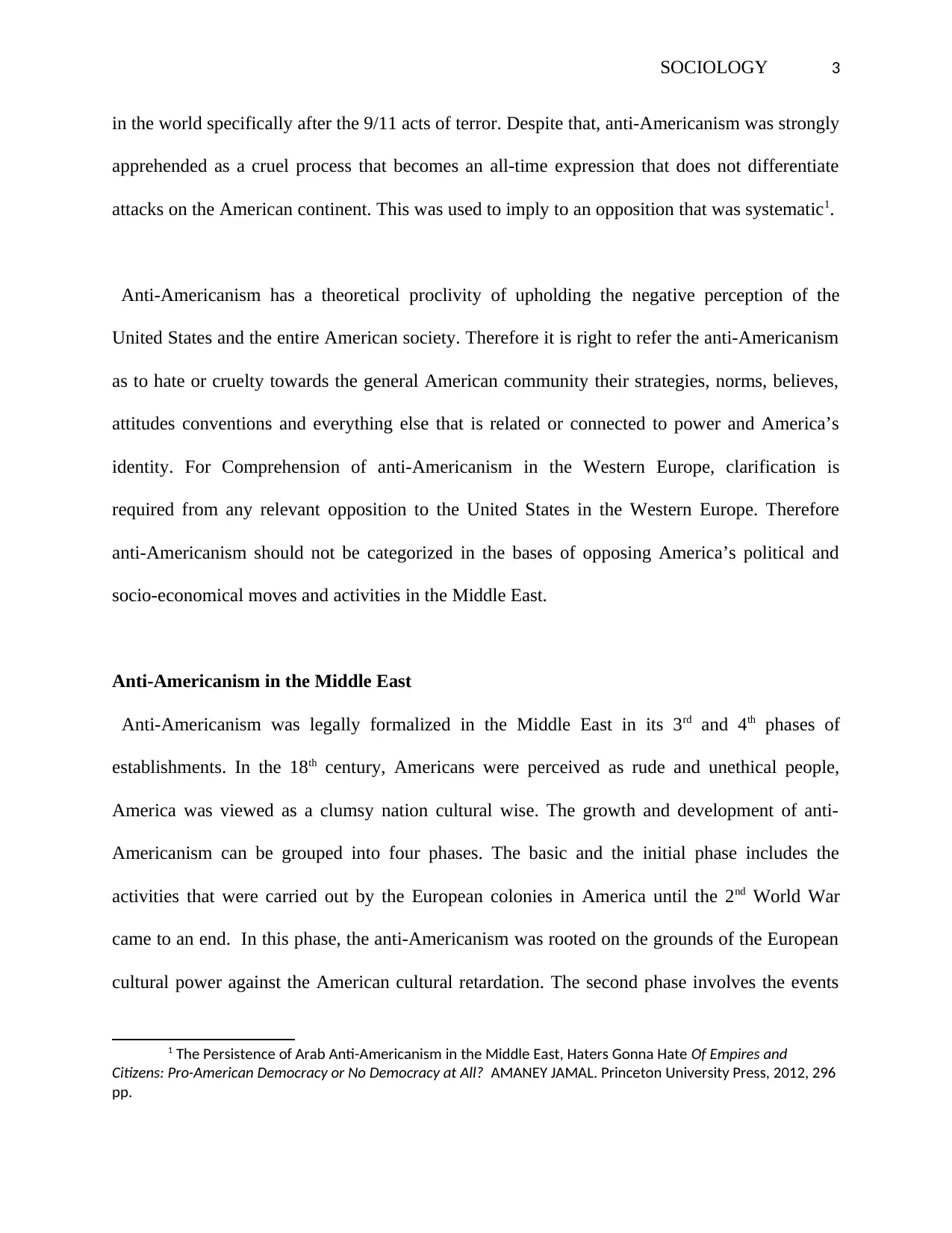
SOCIOLOGY 3
in the world specifically after the 9/11 acts of terror. Despite that, anti-Americanism was strongly
apprehended as a cruel process that becomes an all-time expression that does not differentiate
attacks on the American continent. This was used to imply to an opposition that was systematic1.
Anti-Americanism has a theoretical proclivity of upholding the negative perception of the
United States and the entire American society. Therefore it is right to refer the anti-Americanism
as to hate or cruelty towards the general American community their strategies, norms, believes,
attitudes conventions and everything else that is related or connected to power and America’s
identity. For Comprehension of anti-Americanism in the Western Europe, clarification is
required from any relevant opposition to the United States in the Western Europe. Therefore
anti-Americanism should not be categorized in the bases of opposing America’s political and
socio-economical moves and activities in the Middle East.
Anti-Americanism in the Middle East
Anti-Americanism was legally formalized in the Middle East in its 3rd and 4th phases of
establishments. In the 18th century, Americans were perceived as rude and unethical people,
America was viewed as a clumsy nation cultural wise. The growth and development of anti-
Americanism can be grouped into four phases. The basic and the initial phase includes the
activities that were carried out by the European colonies in America until the 2nd World War
came to an end. In this phase, the anti-Americanism was rooted on the grounds of the European
cultural power against the American cultural retardation. The second phase involves the events
1 The Persistence of Arab Anti-Americanism in the Middle East, Haters Gonna Hate Of Empires and
Citizens: Pro-American Democracy or No Democracy at All? AMANEY JAMAL. Princeton University Press, 2012, 296
pp.
in the world specifically after the 9/11 acts of terror. Despite that, anti-Americanism was strongly
apprehended as a cruel process that becomes an all-time expression that does not differentiate
attacks on the American continent. This was used to imply to an opposition that was systematic1.
Anti-Americanism has a theoretical proclivity of upholding the negative perception of the
United States and the entire American society. Therefore it is right to refer the anti-Americanism
as to hate or cruelty towards the general American community their strategies, norms, believes,
attitudes conventions and everything else that is related or connected to power and America’s
identity. For Comprehension of anti-Americanism in the Western Europe, clarification is
required from any relevant opposition to the United States in the Western Europe. Therefore
anti-Americanism should not be categorized in the bases of opposing America’s political and
socio-economical moves and activities in the Middle East.
Anti-Americanism in the Middle East
Anti-Americanism was legally formalized in the Middle East in its 3rd and 4th phases of
establishments. In the 18th century, Americans were perceived as rude and unethical people,
America was viewed as a clumsy nation cultural wise. The growth and development of anti-
Americanism can be grouped into four phases. The basic and the initial phase includes the
activities that were carried out by the European colonies in America until the 2nd World War
came to an end. In this phase, the anti-Americanism was rooted on the grounds of the European
cultural power against the American cultural retardation. The second phase involves the events
1 The Persistence of Arab Anti-Americanism in the Middle East, Haters Gonna Hate Of Empires and
Citizens: Pro-American Democracy or No Democracy at All? AMANEY JAMAL. Princeton University Press, 2012, 296
pp.
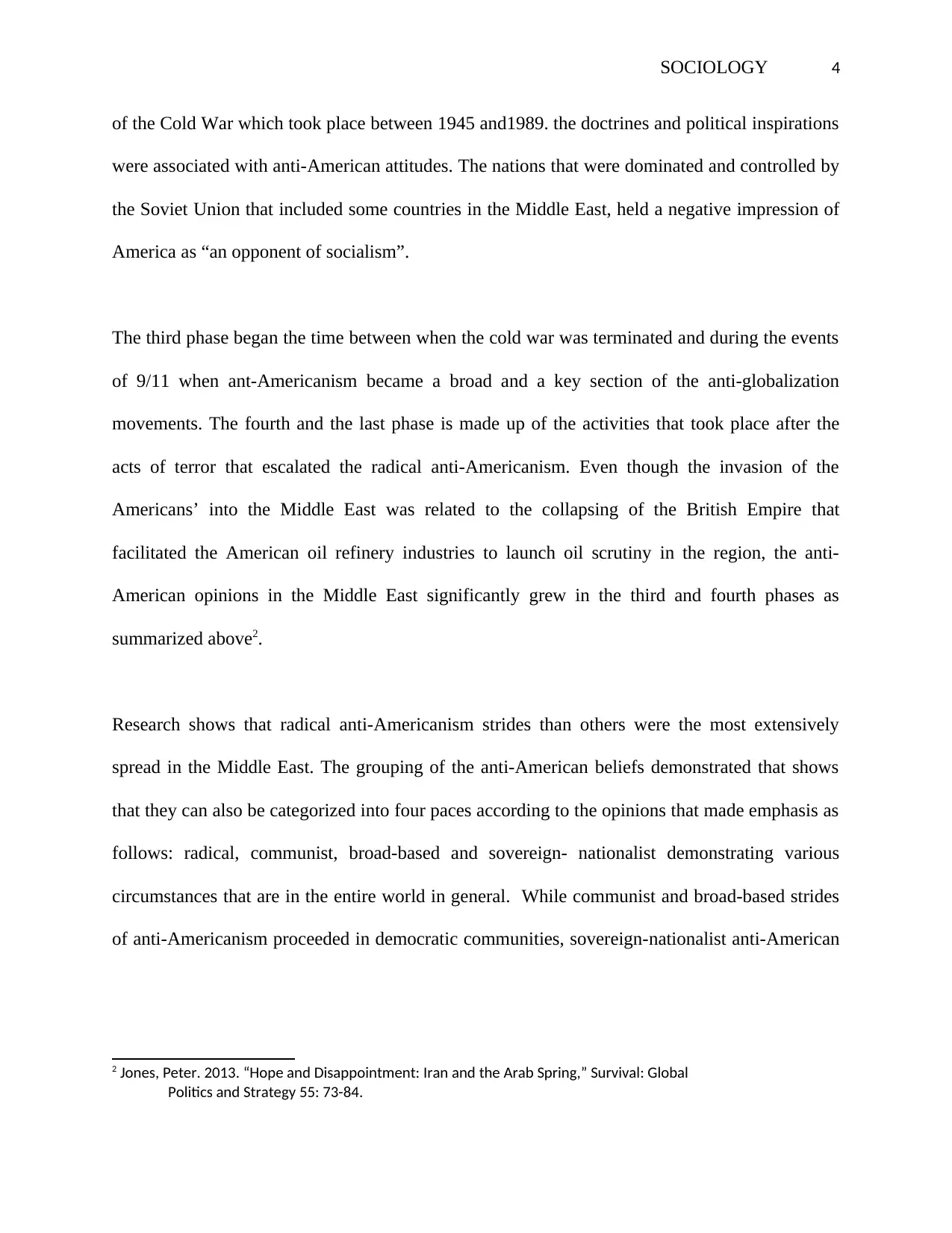
SOCIOLOGY 4
of the Cold War which took place between 1945 and1989. the doctrines and political inspirations
were associated with anti-American attitudes. The nations that were dominated and controlled by
the Soviet Union that included some countries in the Middle East, held a negative impression of
America as “an opponent of socialism”.
The third phase began the time between when the cold war was terminated and during the events
of 9/11 when ant-Americanism became a broad and a key section of the anti-globalization
movements. The fourth and the last phase is made up of the activities that took place after the
acts of terror that escalated the radical anti-Americanism. Even though the invasion of the
Americans’ into the Middle East was related to the collapsing of the British Empire that
facilitated the American oil refinery industries to launch oil scrutiny in the region, the anti-
American opinions in the Middle East significantly grew in the third and fourth phases as
summarized above2.
Research shows that radical anti-Americanism strides than others were the most extensively
spread in the Middle East. The grouping of the anti-American beliefs demonstrated that shows
that they can also be categorized into four paces according to the opinions that made emphasis as
follows: radical, communist, broad-based and sovereign- nationalist demonstrating various
circumstances that are in the entire world in general. While communist and broad-based strides
of anti-Americanism proceeded in democratic communities, sovereign-nationalist anti-American
2 Jones, Peter. 2013. “Hope and Disappointment: Iran and the Arab Spring,” Survival: Global
Politics and Strategy 55: 73-84.
of the Cold War which took place between 1945 and1989. the doctrines and political inspirations
were associated with anti-American attitudes. The nations that were dominated and controlled by
the Soviet Union that included some countries in the Middle East, held a negative impression of
America as “an opponent of socialism”.
The third phase began the time between when the cold war was terminated and during the events
of 9/11 when ant-Americanism became a broad and a key section of the anti-globalization
movements. The fourth and the last phase is made up of the activities that took place after the
acts of terror that escalated the radical anti-Americanism. Even though the invasion of the
Americans’ into the Middle East was related to the collapsing of the British Empire that
facilitated the American oil refinery industries to launch oil scrutiny in the region, the anti-
American opinions in the Middle East significantly grew in the third and fourth phases as
summarized above2.
Research shows that radical anti-Americanism strides than others were the most extensively
spread in the Middle East. The grouping of the anti-American beliefs demonstrated that shows
that they can also be categorized into four paces according to the opinions that made emphasis as
follows: radical, communist, broad-based and sovereign- nationalist demonstrating various
circumstances that are in the entire world in general. While communist and broad-based strides
of anti-Americanism proceeded in democratic communities, sovereign-nationalist anti-American
2 Jones, Peter. 2013. “Hope and Disappointment: Iran and the Arab Spring,” Survival: Global
Politics and Strategy 55: 73-84.
Secure Best Marks with AI Grader
Need help grading? Try our AI Grader for instant feedback on your assignments.
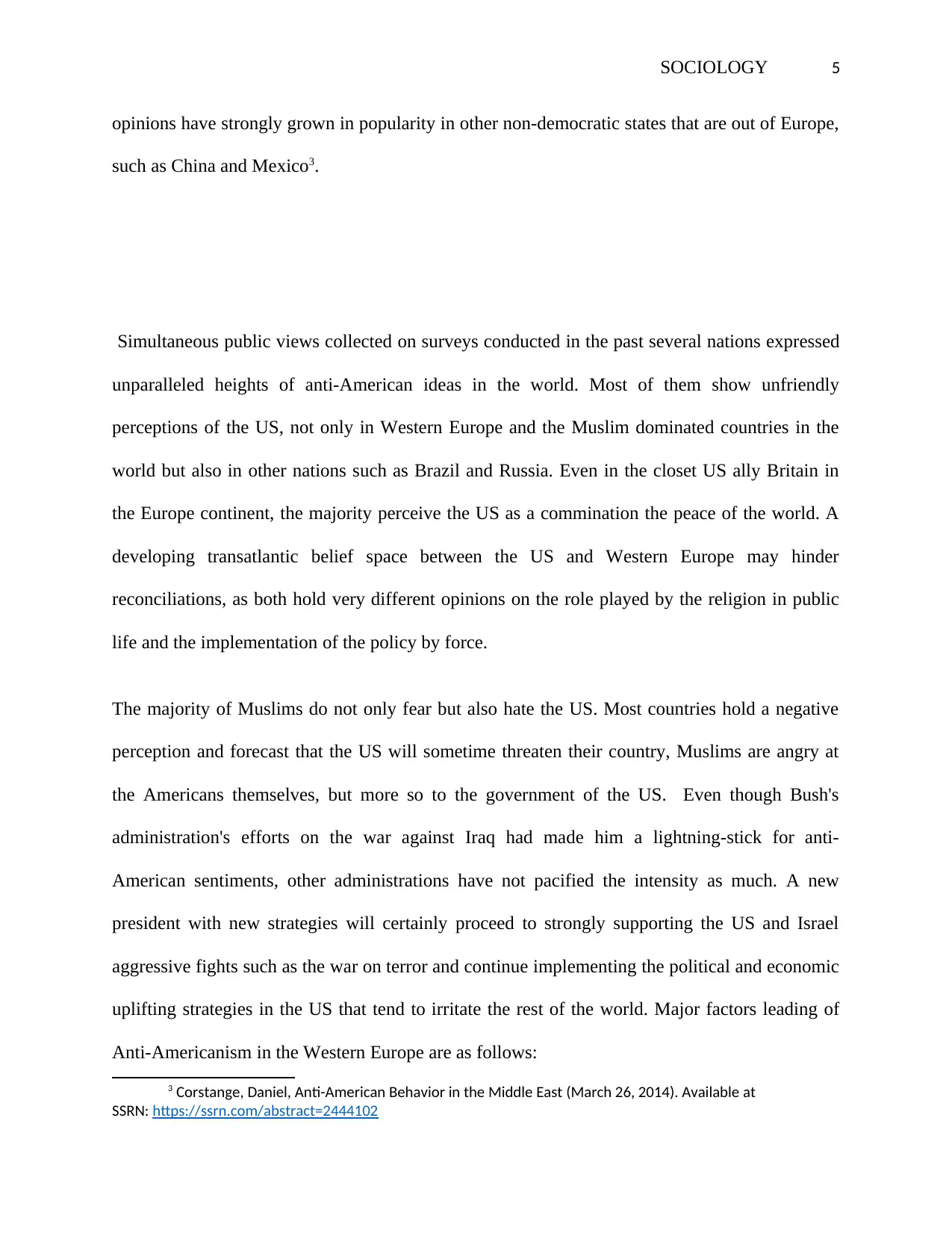
SOCIOLOGY 5
opinions have strongly grown in popularity in other non-democratic states that are out of Europe,
such as China and Mexico3.
Simultaneous public views collected on surveys conducted in the past several nations expressed
unparalleled heights of anti-American ideas in the world. Most of them show unfriendly
perceptions of the US, not only in Western Europe and the Muslim dominated countries in the
world but also in other nations such as Brazil and Russia. Even in the closet US ally Britain in
the Europe continent, the majority perceive the US as a commination the peace of the world. A
developing transatlantic belief space between the US and Western Europe may hinder
reconciliations, as both hold very different opinions on the role played by the religion in public
life and the implementation of the policy by force.
The majority of Muslims do not only fear but also hate the US. Most countries hold a negative
perception and forecast that the US will sometime threaten their country, Muslims are angry at
the Americans themselves, but more so to the government of the US. Even though Bush's
administration's efforts on the war against Iraq had made him a lightning-stick for anti-
American sentiments, other administrations have not pacified the intensity as much. A new
president with new strategies will certainly proceed to strongly supporting the US and Israel
aggressive fights such as the war on terror and continue implementing the political and economic
uplifting strategies in the US that tend to irritate the rest of the world. Major factors leading of
Anti-Americanism in the Western Europe are as follows:
3 Corstange, Daniel, Anti-American Behavior in the Middle East (March 26, 2014). Available at
SSRN: https://ssrn.com/abstract=2444102
opinions have strongly grown in popularity in other non-democratic states that are out of Europe,
such as China and Mexico3.
Simultaneous public views collected on surveys conducted in the past several nations expressed
unparalleled heights of anti-American ideas in the world. Most of them show unfriendly
perceptions of the US, not only in Western Europe and the Muslim dominated countries in the
world but also in other nations such as Brazil and Russia. Even in the closet US ally Britain in
the Europe continent, the majority perceive the US as a commination the peace of the world. A
developing transatlantic belief space between the US and Western Europe may hinder
reconciliations, as both hold very different opinions on the role played by the religion in public
life and the implementation of the policy by force.
The majority of Muslims do not only fear but also hate the US. Most countries hold a negative
perception and forecast that the US will sometime threaten their country, Muslims are angry at
the Americans themselves, but more so to the government of the US. Even though Bush's
administration's efforts on the war against Iraq had made him a lightning-stick for anti-
American sentiments, other administrations have not pacified the intensity as much. A new
president with new strategies will certainly proceed to strongly supporting the US and Israel
aggressive fights such as the war on terror and continue implementing the political and economic
uplifting strategies in the US that tend to irritate the rest of the world. Major factors leading of
Anti-Americanism in the Western Europe are as follows:
3 Corstange, Daniel, Anti-American Behavior in the Middle East (March 26, 2014). Available at
SSRN: https://ssrn.com/abstract=2444102
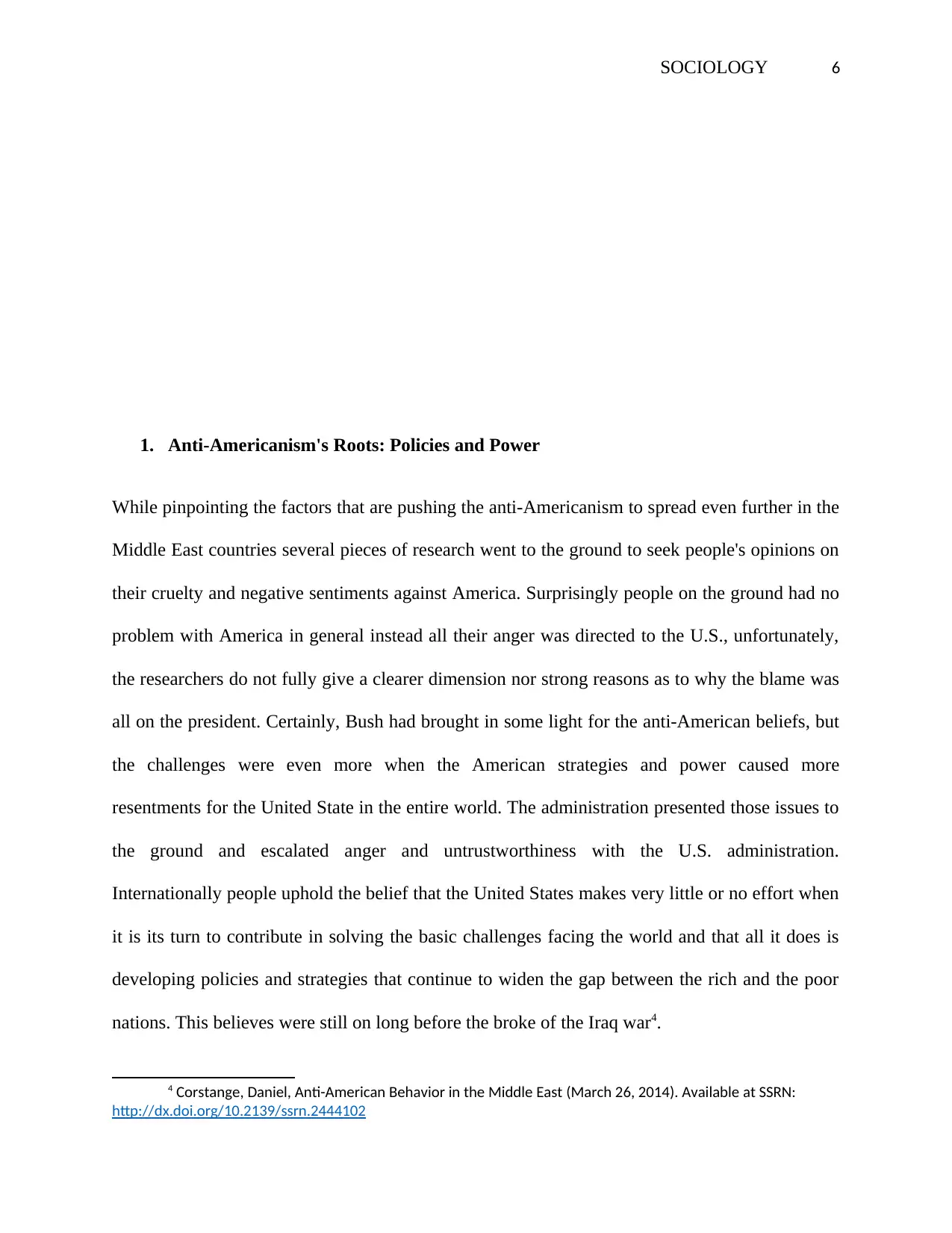
SOCIOLOGY 6
1. Anti-Americanism's Roots: Policies and Power
While pinpointing the factors that are pushing the anti-Americanism to spread even further in the
Middle East countries several pieces of research went to the ground to seek people's opinions on
their cruelty and negative sentiments against America. Surprisingly people on the ground had no
problem with America in general instead all their anger was directed to the U.S., unfortunately,
the researchers do not fully give a clearer dimension nor strong reasons as to why the blame was
all on the president. Certainly, Bush had brought in some light for the anti-American beliefs, but
the challenges were even more when the American strategies and power caused more
resentments for the United State in the entire world. The administration presented those issues to
the ground and escalated anger and untrustworthiness with the U.S. administration.
Internationally people uphold the belief that the United States makes very little or no effort when
it is its turn to contribute in solving the basic challenges facing the world and that all it does is
developing policies and strategies that continue to widen the gap between the rich and the poor
nations. This believes were still on long before the broke of the Iraq war4.
4 Corstange, Daniel, Anti-American Behavior in the Middle East (March 26, 2014). Available at SSRN:
http://dx.doi.org/10.2139/ssrn.2444102
1. Anti-Americanism's Roots: Policies and Power
While pinpointing the factors that are pushing the anti-Americanism to spread even further in the
Middle East countries several pieces of research went to the ground to seek people's opinions on
their cruelty and negative sentiments against America. Surprisingly people on the ground had no
problem with America in general instead all their anger was directed to the U.S., unfortunately,
the researchers do not fully give a clearer dimension nor strong reasons as to why the blame was
all on the president. Certainly, Bush had brought in some light for the anti-American beliefs, but
the challenges were even more when the American strategies and power caused more
resentments for the United State in the entire world. The administration presented those issues to
the ground and escalated anger and untrustworthiness with the U.S. administration.
Internationally people uphold the belief that the United States makes very little or no effort when
it is its turn to contribute in solving the basic challenges facing the world and that all it does is
developing policies and strategies that continue to widen the gap between the rich and the poor
nations. This believes were still on long before the broke of the Iraq war4.
4 Corstange, Daniel, Anti-American Behavior in the Middle East (March 26, 2014). Available at SSRN:
http://dx.doi.org/10.2139/ssrn.2444102
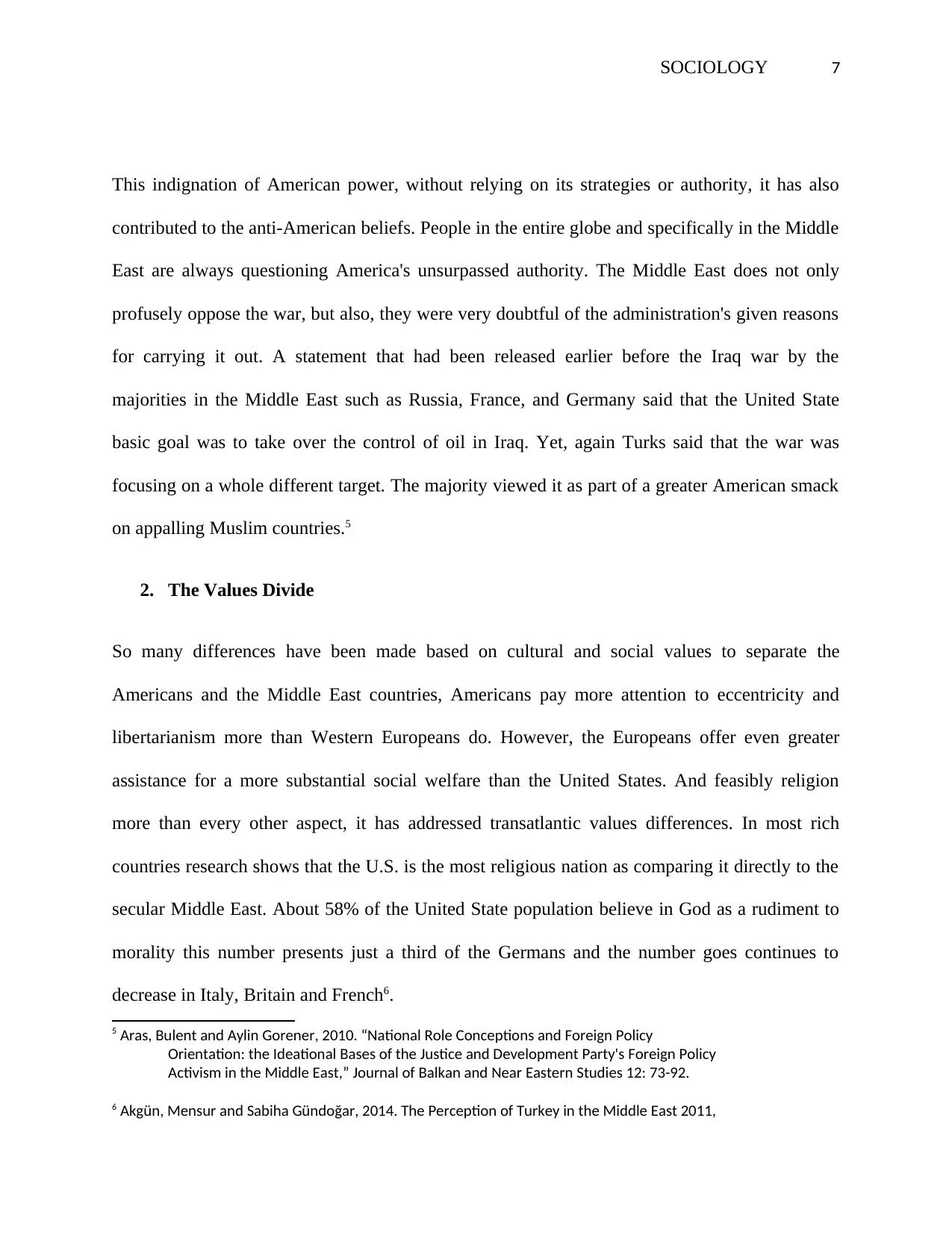
SOCIOLOGY 7
This indignation of American power, without relying on its strategies or authority, it has also
contributed to the anti-American beliefs. People in the entire globe and specifically in the Middle
East are always questioning America's unsurpassed authority. The Middle East does not only
profusely oppose the war, but also, they were very doubtful of the administration's given reasons
for carrying it out. A statement that had been released earlier before the Iraq war by the
majorities in the Middle East such as Russia, France, and Germany said that the United State
basic goal was to take over the control of oil in Iraq. Yet, again Turks said that the war was
focusing on a whole different target. The majority viewed it as part of a greater American smack
on appalling Muslim countries.5
2. The Values Divide
So many differences have been made based on cultural and social values to separate the
Americans and the Middle East countries, Americans pay more attention to eccentricity and
libertarianism more than Western Europeans do. However, the Europeans offer even greater
assistance for a more substantial social welfare than the United States. And feasibly religion
more than every other aspect, it has addressed transatlantic values differences. In most rich
countries research shows that the U.S. is the most religious nation as comparing it directly to the
secular Middle East. About 58% of the United State population believe in God as a rudiment to
morality this number presents just a third of the Germans and the number goes continues to
decrease in Italy, Britain and French6.
5 Aras, Bulent and Aylin Gorener, 2010. “National Role Conceptions and Foreign Policy
Orientation: the Ideational Bases of the Justice and Development Party's Foreign Policy
Activism in the Middle East,” Journal of Balkan and Near Eastern Studies 12: 73-92.
6 Akgün, Mensur and Sabiha Gündoğar, 2014. The Perception of Turkey in the Middle East 2011,
This indignation of American power, without relying on its strategies or authority, it has also
contributed to the anti-American beliefs. People in the entire globe and specifically in the Middle
East are always questioning America's unsurpassed authority. The Middle East does not only
profusely oppose the war, but also, they were very doubtful of the administration's given reasons
for carrying it out. A statement that had been released earlier before the Iraq war by the
majorities in the Middle East such as Russia, France, and Germany said that the United State
basic goal was to take over the control of oil in Iraq. Yet, again Turks said that the war was
focusing on a whole different target. The majority viewed it as part of a greater American smack
on appalling Muslim countries.5
2. The Values Divide
So many differences have been made based on cultural and social values to separate the
Americans and the Middle East countries, Americans pay more attention to eccentricity and
libertarianism more than Western Europeans do. However, the Europeans offer even greater
assistance for a more substantial social welfare than the United States. And feasibly religion
more than every other aspect, it has addressed transatlantic values differences. In most rich
countries research shows that the U.S. is the most religious nation as comparing it directly to the
secular Middle East. About 58% of the United State population believe in God as a rudiment to
morality this number presents just a third of the Germans and the number goes continues to
decrease in Italy, Britain and French6.
5 Aras, Bulent and Aylin Gorener, 2010. “National Role Conceptions and Foreign Policy
Orientation: the Ideational Bases of the Justice and Development Party's Foreign Policy
Activism in the Middle East,” Journal of Balkan and Near Eastern Studies 12: 73-92.
6 Akgün, Mensur and Sabiha Gündoğar, 2014. The Perception of Turkey in the Middle East 2011,
Paraphrase This Document
Need a fresh take? Get an instant paraphrase of this document with our AI Paraphraser
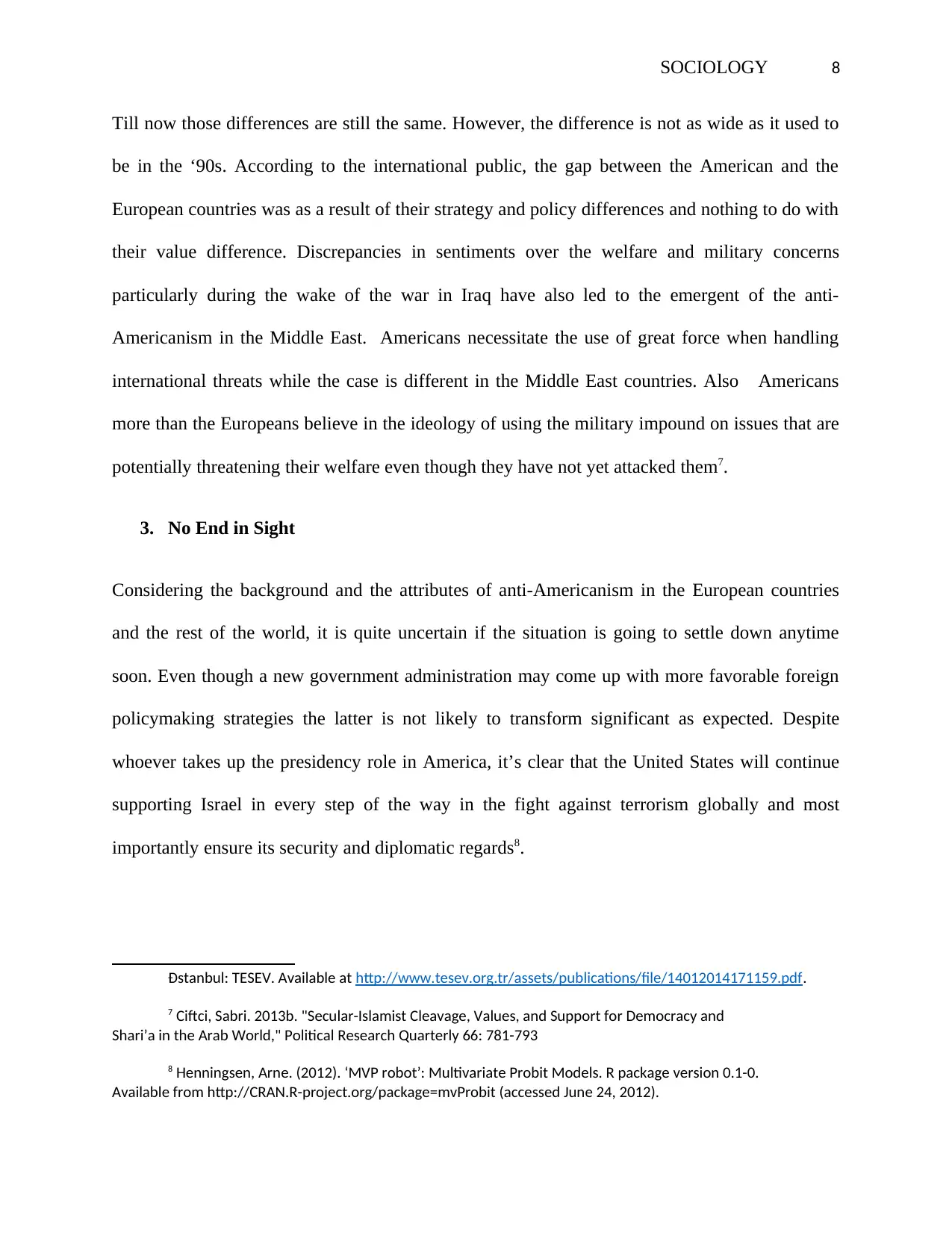
SOCIOLOGY 8
Till now those differences are still the same. However, the difference is not as wide as it used to
be in the ‘90s. According to the international public, the gap between the American and the
European countries was as a result of their strategy and policy differences and nothing to do with
their value difference. Discrepancies in sentiments over the welfare and military concerns
particularly during the wake of the war in Iraq have also led to the emergent of the anti-
Americanism in the Middle East. Americans necessitate the use of great force when handling
international threats while the case is different in the Middle East countries. Also Americans
more than the Europeans believe in the ideology of using the military impound on issues that are
potentially threatening their welfare even though they have not yet attacked them7.
3. No End in Sight
Considering the background and the attributes of anti-Americanism in the European countries
and the rest of the world, it is quite uncertain if the situation is going to settle down anytime
soon. Even though a new government administration may come up with more favorable foreign
policymaking strategies the latter is not likely to transform significant as expected. Despite
whoever takes up the presidency role in America, it’s clear that the United States will continue
supporting Israel in every step of the way in the fight against terrorism globally and most
importantly ensure its security and diplomatic regards8.
Đstanbul: TESEV. Available at http://www.tesev.org.tr/assets/publications/file/14012014171159.pdf.
7 Ciftci, Sabri. 2013b. "Secular-Islamist Cleavage, Values, and Support for Democracy and
Shari’a in the Arab World," Political Research Quarterly 66: 781-793
8 Henningsen, Arne. (2012). ‘MVP robot’: Multivariate Probit Models. R package version 0.1-0.
Available from http://CRAN.R-project.org/package=mvProbit (accessed June 24, 2012).
Till now those differences are still the same. However, the difference is not as wide as it used to
be in the ‘90s. According to the international public, the gap between the American and the
European countries was as a result of their strategy and policy differences and nothing to do with
their value difference. Discrepancies in sentiments over the welfare and military concerns
particularly during the wake of the war in Iraq have also led to the emergent of the anti-
Americanism in the Middle East. Americans necessitate the use of great force when handling
international threats while the case is different in the Middle East countries. Also Americans
more than the Europeans believe in the ideology of using the military impound on issues that are
potentially threatening their welfare even though they have not yet attacked them7.
3. No End in Sight
Considering the background and the attributes of anti-Americanism in the European countries
and the rest of the world, it is quite uncertain if the situation is going to settle down anytime
soon. Even though a new government administration may come up with more favorable foreign
policymaking strategies the latter is not likely to transform significant as expected. Despite
whoever takes up the presidency role in America, it’s clear that the United States will continue
supporting Israel in every step of the way in the fight against terrorism globally and most
importantly ensure its security and diplomatic regards8.
Đstanbul: TESEV. Available at http://www.tesev.org.tr/assets/publications/file/14012014171159.pdf.
7 Ciftci, Sabri. 2013b. "Secular-Islamist Cleavage, Values, and Support for Democracy and
Shari’a in the Arab World," Political Research Quarterly 66: 781-793
8 Henningsen, Arne. (2012). ‘MVP robot’: Multivariate Probit Models. R package version 0.1-0.
Available from http://CRAN.R-project.org/package=mvProbit (accessed June 24, 2012).
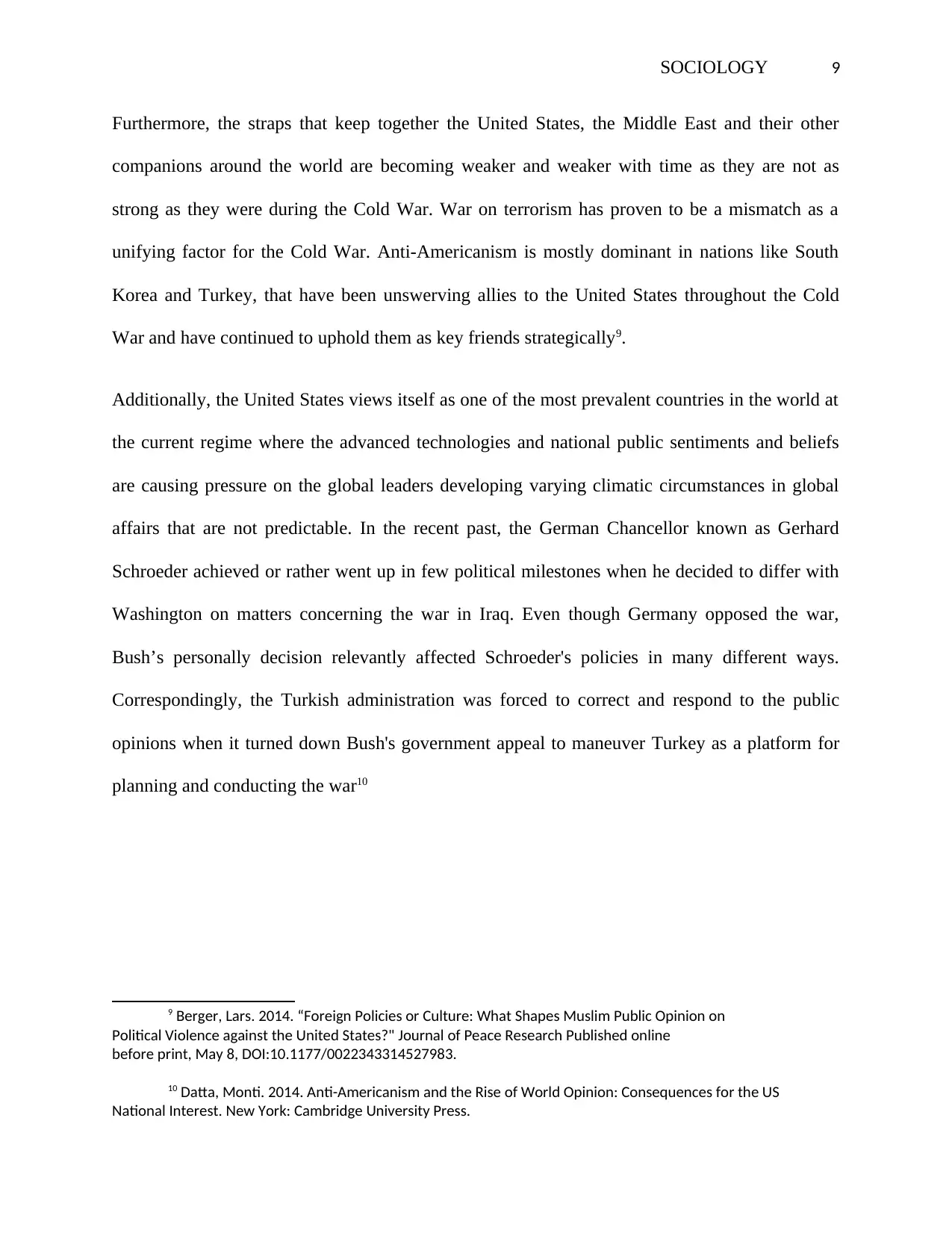
SOCIOLOGY 9
Furthermore, the straps that keep together the United States, the Middle East and their other
companions around the world are becoming weaker and weaker with time as they are not as
strong as they were during the Cold War. War on terrorism has proven to be a mismatch as a
unifying factor for the Cold War. Anti-Americanism is mostly dominant in nations like South
Korea and Turkey, that have been unswerving allies to the United States throughout the Cold
War and have continued to uphold them as key friends strategically9.
Additionally, the United States views itself as one of the most prevalent countries in the world at
the current regime where the advanced technologies and national public sentiments and beliefs
are causing pressure on the global leaders developing varying climatic circumstances in global
affairs that are not predictable. In the recent past, the German Chancellor known as Gerhard
Schroeder achieved or rather went up in few political milestones when he decided to differ with
Washington on matters concerning the war in Iraq. Even though Germany opposed the war,
Bush’s personally decision relevantly affected Schroeder's policies in many different ways.
Correspondingly, the Turkish administration was forced to correct and respond to the public
opinions when it turned down Bush's government appeal to maneuver Turkey as a platform for
planning and conducting the war10
9 Berger, Lars. 2014. “Foreign Policies or Culture: What Shapes Muslim Public Opinion on
Political Violence against the United States?" Journal of Peace Research Published online
before print, May 8, DOI:10.1177/0022343314527983.
10 Datta, Monti. 2014. Anti-Americanism and the Rise of World Opinion: Consequences for the US
National Interest. New York: Cambridge University Press.
Furthermore, the straps that keep together the United States, the Middle East and their other
companions around the world are becoming weaker and weaker with time as they are not as
strong as they were during the Cold War. War on terrorism has proven to be a mismatch as a
unifying factor for the Cold War. Anti-Americanism is mostly dominant in nations like South
Korea and Turkey, that have been unswerving allies to the United States throughout the Cold
War and have continued to uphold them as key friends strategically9.
Additionally, the United States views itself as one of the most prevalent countries in the world at
the current regime where the advanced technologies and national public sentiments and beliefs
are causing pressure on the global leaders developing varying climatic circumstances in global
affairs that are not predictable. In the recent past, the German Chancellor known as Gerhard
Schroeder achieved or rather went up in few political milestones when he decided to differ with
Washington on matters concerning the war in Iraq. Even though Germany opposed the war,
Bush’s personally decision relevantly affected Schroeder's policies in many different ways.
Correspondingly, the Turkish administration was forced to correct and respond to the public
opinions when it turned down Bush's government appeal to maneuver Turkey as a platform for
planning and conducting the war10
9 Berger, Lars. 2014. “Foreign Policies or Culture: What Shapes Muslim Public Opinion on
Political Violence against the United States?" Journal of Peace Research Published online
before print, May 8, DOI:10.1177/0022343314527983.
10 Datta, Monti. 2014. Anti-Americanism and the Rise of World Opinion: Consequences for the US
National Interest. New York: Cambridge University Press.
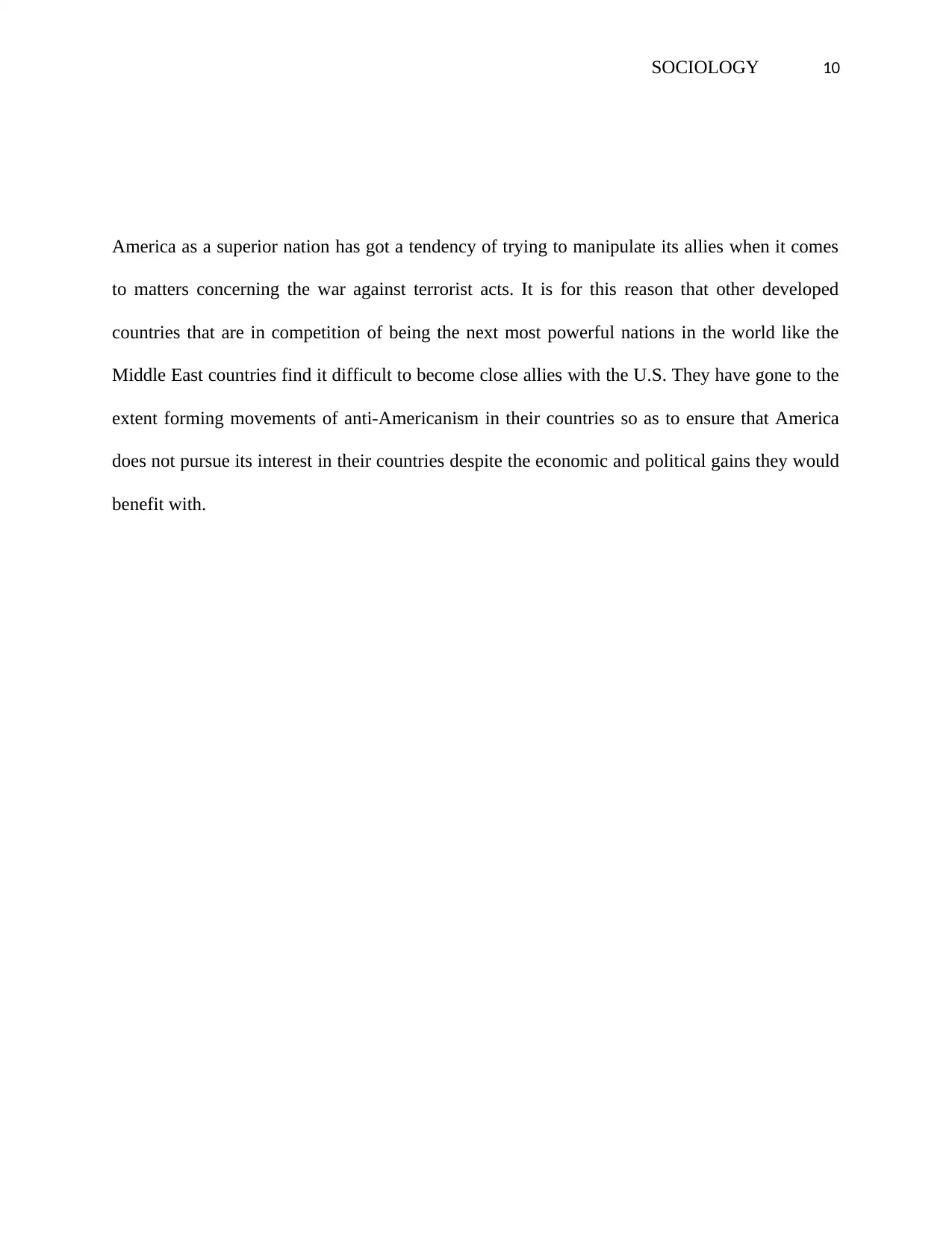
SOCIOLOGY 10
America as a superior nation has got a tendency of trying to manipulate its allies when it comes
to matters concerning the war against terrorist acts. It is for this reason that other developed
countries that are in competition of being the next most powerful nations in the world like the
Middle East countries find it difficult to become close allies with the U.S. They have gone to the
extent forming movements of anti-Americanism in their countries so as to ensure that America
does not pursue its interest in their countries despite the economic and political gains they would
benefit with.
America as a superior nation has got a tendency of trying to manipulate its allies when it comes
to matters concerning the war against terrorist acts. It is for this reason that other developed
countries that are in competition of being the next most powerful nations in the world like the
Middle East countries find it difficult to become close allies with the U.S. They have gone to the
extent forming movements of anti-Americanism in their countries so as to ensure that America
does not pursue its interest in their countries despite the economic and political gains they would
benefit with.
Secure Best Marks with AI Grader
Need help grading? Try our AI Grader for instant feedback on your assignments.
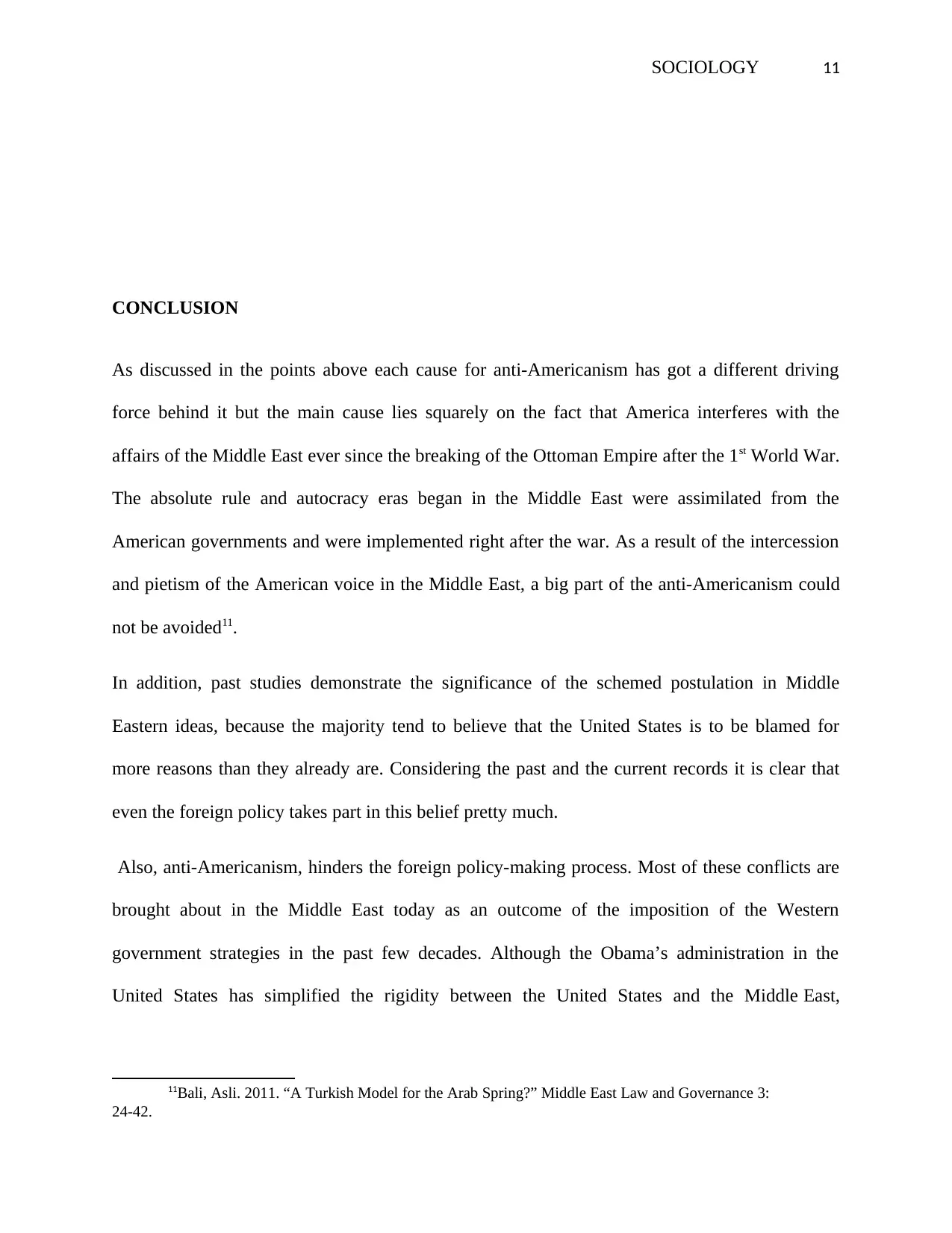
SOCIOLOGY 11
CONCLUSION
As discussed in the points above each cause for anti-Americanism has got a different driving
force behind it but the main cause lies squarely on the fact that America interferes with the
affairs of the Middle East ever since the breaking of the Ottoman Empire after the 1st World War.
The absolute rule and autocracy eras began in the Middle East were assimilated from the
American governments and were implemented right after the war. As a result of the intercession
and pietism of the American voice in the Middle East, a big part of the anti-Americanism could
not be avoided11.
In addition, past studies demonstrate the significance of the schemed postulation in Middle
Eastern ideas, because the majority tend to believe that the United States is to be blamed for
more reasons than they already are. Considering the past and the current records it is clear that
even the foreign policy takes part in this belief pretty much.
Also, anti-Americanism, hinders the foreign policy-making process. Most of these conflicts are
brought about in the Middle East today as an outcome of the imposition of the Western
government strategies in the past few decades. Although the Obama’s administration in the
United States has simplified the rigidity between the United States and the Middle East,
11Bali, Asli. 2011. “A Turkish Model for the Arab Spring?” Middle East Law and Governance 3:
24-42.
CONCLUSION
As discussed in the points above each cause for anti-Americanism has got a different driving
force behind it but the main cause lies squarely on the fact that America interferes with the
affairs of the Middle East ever since the breaking of the Ottoman Empire after the 1st World War.
The absolute rule and autocracy eras began in the Middle East were assimilated from the
American governments and were implemented right after the war. As a result of the intercession
and pietism of the American voice in the Middle East, a big part of the anti-Americanism could
not be avoided11.
In addition, past studies demonstrate the significance of the schemed postulation in Middle
Eastern ideas, because the majority tend to believe that the United States is to be blamed for
more reasons than they already are. Considering the past and the current records it is clear that
even the foreign policy takes part in this belief pretty much.
Also, anti-Americanism, hinders the foreign policy-making process. Most of these conflicts are
brought about in the Middle East today as an outcome of the imposition of the Western
government strategies in the past few decades. Although the Obama’s administration in the
United States has simplified the rigidity between the United States and the Middle East,
11Bali, Asli. 2011. “A Turkish Model for the Arab Spring?” Middle East Law and Governance 3:
24-42.
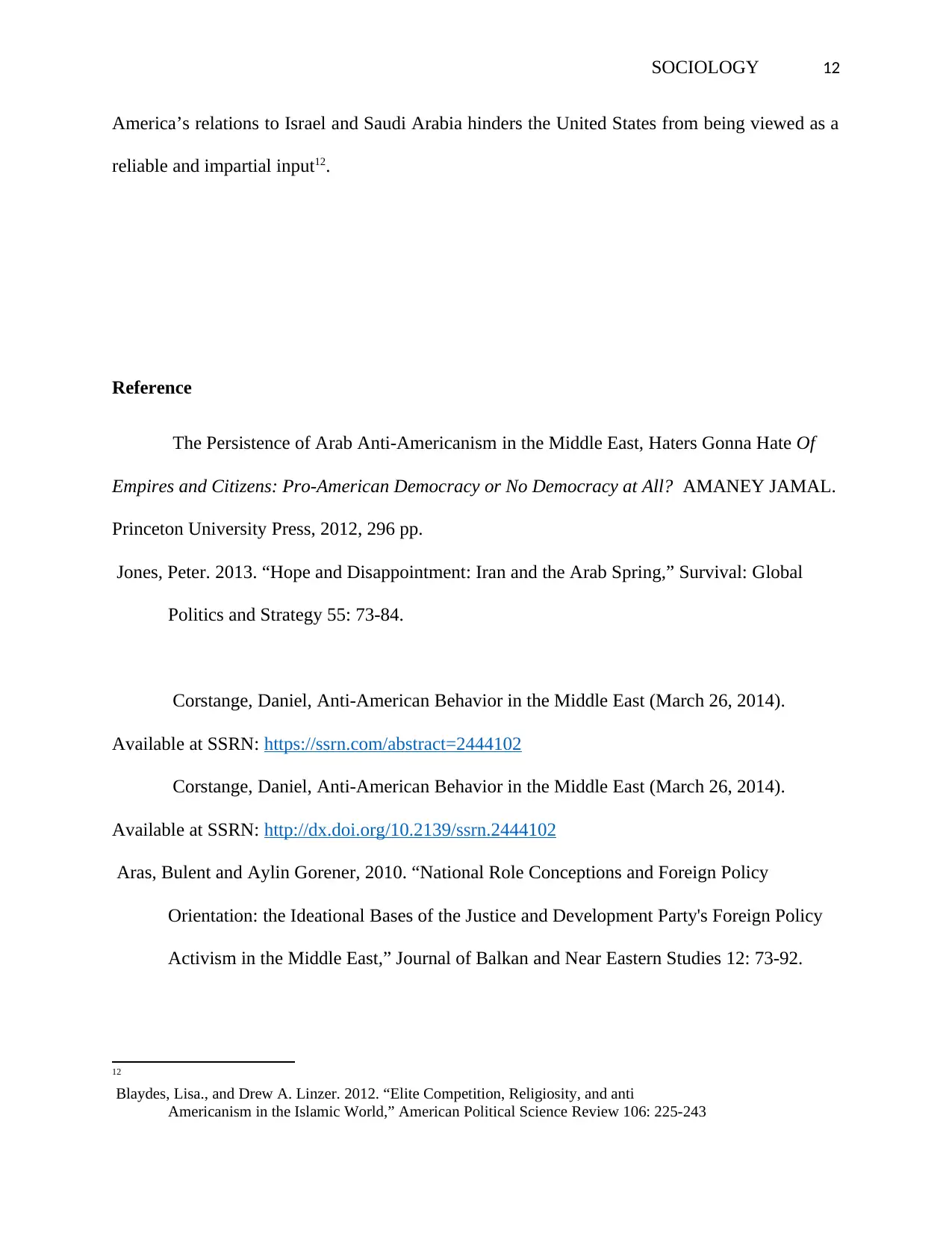
SOCIOLOGY 12
America’s relations to Israel and Saudi Arabia hinders the United States from being viewed as a
reliable and impartial input12.
Reference
The Persistence of Arab Anti-Americanism in the Middle East, Haters Gonna Hate Of
Empires and Citizens: Pro-American Democracy or No Democracy at All? AMANEY JAMAL.
Princeton University Press, 2012, 296 pp.
Jones, Peter. 2013. “Hope and Disappointment: Iran and the Arab Spring,” Survival: Global
Politics and Strategy 55: 73-84.
Corstange, Daniel, Anti-American Behavior in the Middle East (March 26, 2014).
Available at SSRN: https://ssrn.com/abstract=2444102
Corstange, Daniel, Anti-American Behavior in the Middle East (March 26, 2014).
Available at SSRN: http://dx.doi.org/10.2139/ssrn.2444102
Aras, Bulent and Aylin Gorener, 2010. “National Role Conceptions and Foreign Policy
Orientation: the Ideational Bases of the Justice and Development Party's Foreign Policy
Activism in the Middle East,” Journal of Balkan and Near Eastern Studies 12: 73-92.
12
Blaydes, Lisa., and Drew A. Linzer. 2012. “Elite Competition, Religiosity, and anti
Americanism in the Islamic World,” American Political Science Review 106: 225-243
America’s relations to Israel and Saudi Arabia hinders the United States from being viewed as a
reliable and impartial input12.
Reference
The Persistence of Arab Anti-Americanism in the Middle East, Haters Gonna Hate Of
Empires and Citizens: Pro-American Democracy or No Democracy at All? AMANEY JAMAL.
Princeton University Press, 2012, 296 pp.
Jones, Peter. 2013. “Hope and Disappointment: Iran and the Arab Spring,” Survival: Global
Politics and Strategy 55: 73-84.
Corstange, Daniel, Anti-American Behavior in the Middle East (March 26, 2014).
Available at SSRN: https://ssrn.com/abstract=2444102
Corstange, Daniel, Anti-American Behavior in the Middle East (March 26, 2014).
Available at SSRN: http://dx.doi.org/10.2139/ssrn.2444102
Aras, Bulent and Aylin Gorener, 2010. “National Role Conceptions and Foreign Policy
Orientation: the Ideational Bases of the Justice and Development Party's Foreign Policy
Activism in the Middle East,” Journal of Balkan and Near Eastern Studies 12: 73-92.
12
Blaydes, Lisa., and Drew A. Linzer. 2012. “Elite Competition, Religiosity, and anti
Americanism in the Islamic World,” American Political Science Review 106: 225-243
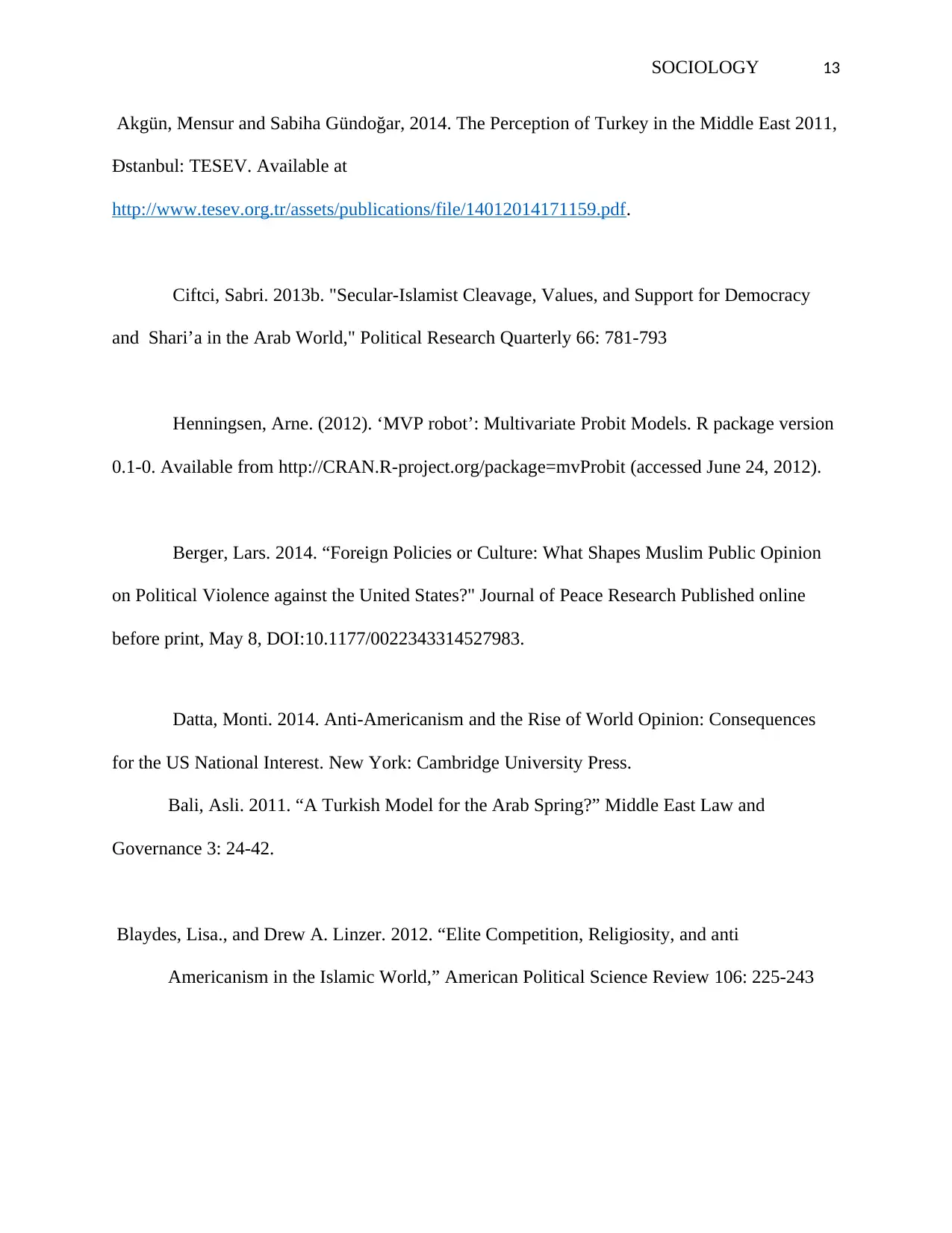
SOCIOLOGY 13
Akgün, Mensur and Sabiha Gündoğar, 2014. The Perception of Turkey in the Middle East 2011,
Đstanbul: TESEV. Available at
http://www.tesev.org.tr/assets/publications/file/14012014171159.pdf.
Ciftci, Sabri. 2013b. "Secular-Islamist Cleavage, Values, and Support for Democracy
and Shari’a in the Arab World," Political Research Quarterly 66: 781-793
Henningsen, Arne. (2012). ‘MVP robot’: Multivariate Probit Models. R package version
0.1-0. Available from http://CRAN.R-project.org/package=mvProbit (accessed June 24, 2012).
Berger, Lars. 2014. “Foreign Policies or Culture: What Shapes Muslim Public Opinion
on Political Violence against the United States?" Journal of Peace Research Published online
before print, May 8, DOI:10.1177/0022343314527983.
Datta, Monti. 2014. Anti-Americanism and the Rise of World Opinion: Consequences
for the US National Interest. New York: Cambridge University Press.
Bali, Asli. 2011. “A Turkish Model for the Arab Spring?” Middle East Law and
Governance 3: 24-42.
Blaydes, Lisa., and Drew A. Linzer. 2012. “Elite Competition, Religiosity, and anti
Americanism in the Islamic World,” American Political Science Review 106: 225-243
Akgün, Mensur and Sabiha Gündoğar, 2014. The Perception of Turkey in the Middle East 2011,
Đstanbul: TESEV. Available at
http://www.tesev.org.tr/assets/publications/file/14012014171159.pdf.
Ciftci, Sabri. 2013b. "Secular-Islamist Cleavage, Values, and Support for Democracy
and Shari’a in the Arab World," Political Research Quarterly 66: 781-793
Henningsen, Arne. (2012). ‘MVP robot’: Multivariate Probit Models. R package version
0.1-0. Available from http://CRAN.R-project.org/package=mvProbit (accessed June 24, 2012).
Berger, Lars. 2014. “Foreign Policies or Culture: What Shapes Muslim Public Opinion
on Political Violence against the United States?" Journal of Peace Research Published online
before print, May 8, DOI:10.1177/0022343314527983.
Datta, Monti. 2014. Anti-Americanism and the Rise of World Opinion: Consequences
for the US National Interest. New York: Cambridge University Press.
Bali, Asli. 2011. “A Turkish Model for the Arab Spring?” Middle East Law and
Governance 3: 24-42.
Blaydes, Lisa., and Drew A. Linzer. 2012. “Elite Competition, Religiosity, and anti
Americanism in the Islamic World,” American Political Science Review 106: 225-243
1 out of 13
Related Documents
Your All-in-One AI-Powered Toolkit for Academic Success.
+13062052269
info@desklib.com
Available 24*7 on WhatsApp / Email
![[object Object]](/_next/static/media/star-bottom.7253800d.svg)
Unlock your academic potential
© 2024 | Zucol Services PVT LTD | All rights reserved.





